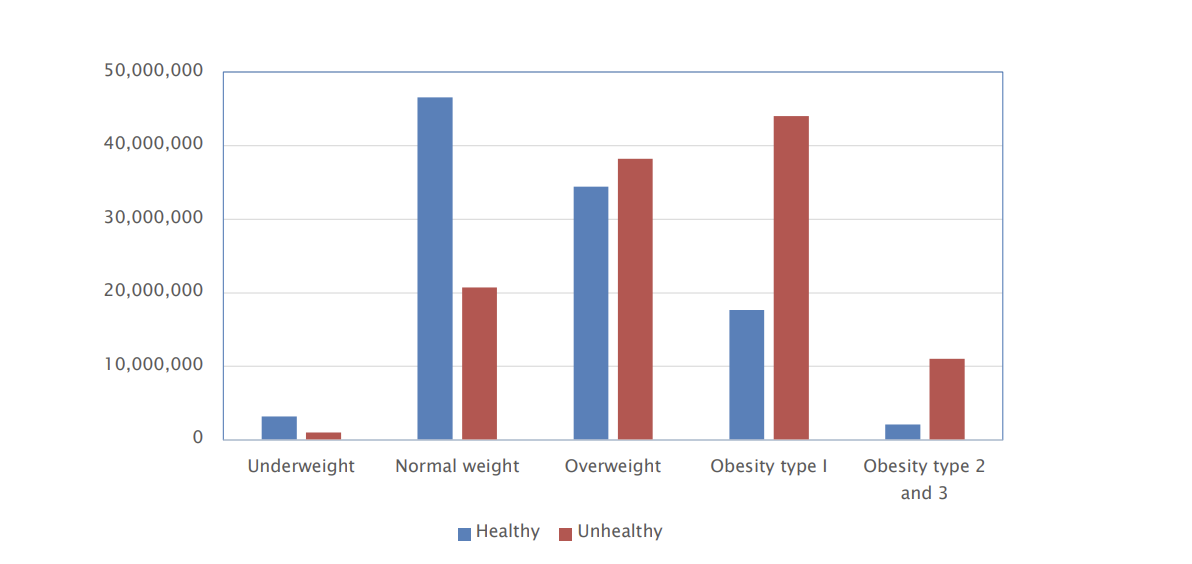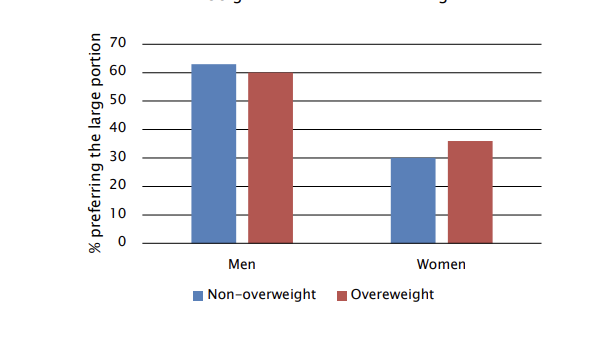Lecture: 3 Obesity Causes and Consequences
1/30
There's no tags or description
Looks like no tags are added yet.
Name | Mastery | Learn | Test | Matching | Spaced | Call with Kai |
|---|
No analytics yet
Send a link to your students to track their progress
31 Terms
What do we mean when we talk about obesity?
We use BMI - body mass index - wherein weight / height. Assumes that taller people will weigh more vs. shorter people.
Considering practically the difference between each ‘category’ is not much for each weight class → not as extreme as we might think.
Sportspeople can have overweight BMI, but still be healthy - a crude measure
What are the general obesity trends?
Generally, the landscape has changed significantly, with obesity increasing amongst all populations on average. With roughly a third of the population of the US being obese by 2010, compared to much lower numbers in 1985.
Majority of adults in westernised countries are overweight or obesity
What is the importance of differentiation between overweight or obesity?
There is a significant difference between overweight and obesity. One is associated with more health risks than the other.
What is abdominal overweight and abdominal obesity?
Is a way to look at weight as a waist circumference
May be valid as it is more associated with poorer health risks than BMI or other measures
May still miss the point as it excludes the fuller picture of a person’s health.
What are the ‘consequences’ of obesity?
Note that ‘consequences’ around obesity may only be inferred using correlational studies. Obesity (class 1 and class 2) is associated with ill health – not overweight, (class 3)
Medical consequences that are associated with obesity →
Heart disease
High blood pressure
Type 2 diabetes.
What is the association of health behaviours on morality of people of different weights?
For people who are engaging with risk factors, those who are in the healthy weight and overweight category are basically equivalent.
For those who aren’t engaging with risk factors, those who are in the healthy weight and overweight category are equivalent.
Generally, this shows that health behaviours matter at least as much as weight categories. Behaviours we can actually do something about it.
What are the associations between cardiometabolic health and BMI?
More people than not are in healthy cardiometabolic health in the normal weight categories, however, in the overweight category, cardiometabolic health is healthy/unhealthy divided evenly amongst those overweight.


Are there obviously benefits of attempting to lose weight?
There are no benefits in all-cause morality
Note that for those of normal weight/overweight → it is more likely to cause mortality.
Only those who are obese and unhealthy → there is benefit to all cause morality.
What are the social consequences of obesity?
those who are overweight and obese are less likely to be accepted to university, receive less family support, experience teasing and social isolation.
Are discriminated against in hiring, wages, promotion and termination
There is an anti-fat bias amongst health-care professionals.
What are the consequences of weight stigma?
Impact on health-care utilisation → the influence of health stigma on people using the health system, this might not allow for regular screening causing poorer health outcome
Psychological consequences → body image distress, negative affect, low self-esteem
Behavioural consequences → eating disordered behaviour, avoidance of exercise, weight gain over time
Health consequences → blood pressure and cardiovascular disease MAY be associated with more weight .
What is the link between motivation to lose weight and weight categories?
There is an underlying assumption that if you motivate people enough you can cause them to lose weight, when in fact, this may not be helpful.
The idea of a tough-love approach doesn’t actually work.
What is the association between stress and obesity stigma?
Wherein indirect pathway, as in engaging with poor behaviour. And direct pathways, as in stress’s direct impact of obesity.
Is weight stigma getting better?
Not really, the obese kid was still ranked the lowest (even lower than before), between 1961 and 2001.
Where does weight stigma come from?
People generally seem to believe that body weight is controllable and therefore, that you should be able to change your weight at will.
There are two sides – whether it is due to genetics or due to avoidance of eating exercise.
You can change people's beliefs but this does not change their attitudes.
What is the pro-effort bias?
There is a more positive benefit for those who seem to be trying to lose weight, compared to people who don’t.
What are the causes of obesity?
Genetic contribution
Energy intake vs. energy expenditure .
What are the biological factors of obesity?
Strong genetic influence - heritability estimates range from 0.6 to 0.85
Metabolism - individual variability in how fast a person can consume the energy that is present in food,
Set-point theory - the idea that each person has a ‘setpoint’ in which our bodies naturally want to set.
Describe the environment as a factor causing obesity?
High accessibility of unhealthy food vs. low accessibility of food
What is Schachter’s Externality hypothesis
Non-obese people eat according to internal cues
Obese people eat in response to external cue.
Study comparing the amount that obese vs. control eating their low preferred food and their high preferred.
Found that obese people are more likely to eat more when external cues signals tastiness
What is the influence of portion size as an external cue?
Portion sizes have increased over time. And so has the increase of obesity as well.
The portion size effect states that people will eat more if there is more.
However, this effect does not increase linearly → mac and cheese
Explain the bottomless bowl experiment?
In a study comparing the bottomless bowl consumption vs. normal bowl consumption, they found that people who eat with the bottomless bowl ate more, but the estimation of how much people eat was equal.
Shows that people don’t recognise how much they are actually eating.
What effect of portion size in children?
Found that in younger children (3) the portion size effect does not appear, but it does appear when they are 5 year old
The tendency to eat in larger portions due to portion size effect is not inbuilt
Note that the age groups in these children are varied.
What is the effect of portion size given taste?
Researchers approached people going to movies offering free popcorn and a drink if they answered surveys afterwards, with popcorn being stale or not, or large or not.
If the popcorn was fresh and large they ate a lot, and if the popcorn was stale and large, they still ate a lot – to the same amount as the normal portion size effect (35%) in this case 33% increase.
Are large portions to blame for the obesity epidemic?
NO
Does the Portion size effect sustain over time?
Longitudinal study gives large meals or small meals over time.
Found that those who eat large meals will continue to eat large meals, shows that the portion size effect holds over time.
Do larger portions lead to weight gain?
Participants given large or small portions of food – looked at change in weight after 6 months.
Found that those who ate small amount of kcal they lose a little bit of weight, but those who eat large amount and control gain weight
Can conclude that if you reduce what you eat you may lose a little bit of weight.
Smaller portions can reduce weight gain.
rather larger portions leading to weight increease.
Are overweight people more susceptible to PSE?
Meta-analysis looked at the effect of portion size in BMI less than 25, vs. BMI over 25. Looks like they are less susceptible to the PSE.
Do overweight people prefer large portions?
Found that male overweight people are less likely to get a large portion compared to normal BMI vs. female overweight people are more likely to get a large portion compared to normal BMI.


What are the external cues proposed by Schachter?
Sensory cues - Something about the food itself
Normative cues - Tells us how we “should” behave .
Do smaller plates help to lose weight?
There is a delboeuf illusion – wherein bigger cycles = bigger plate, but smaller cycles = smaller plate
Doesn’t help to lose weight, might help to reduce energy intake if there is no more other food.